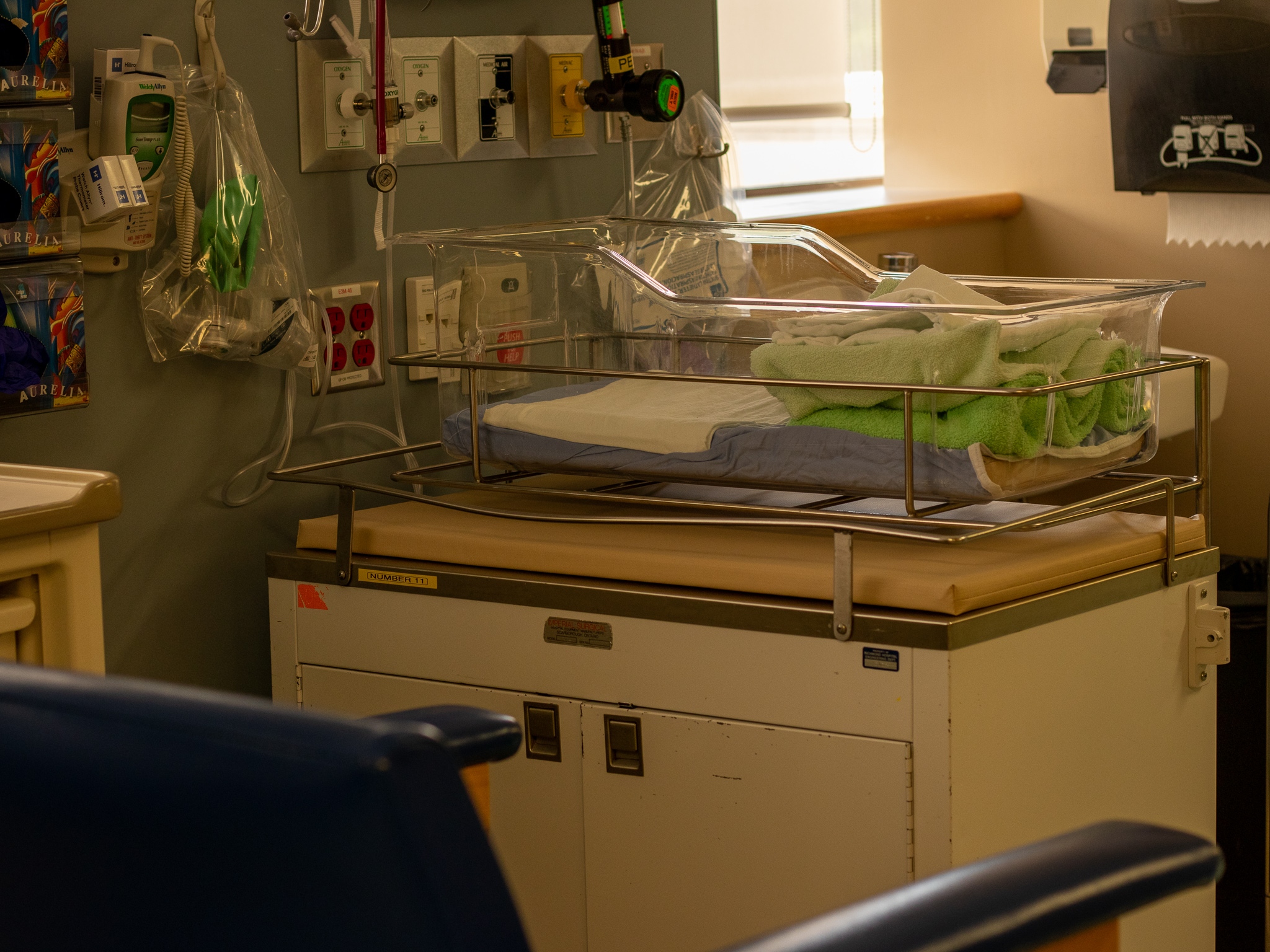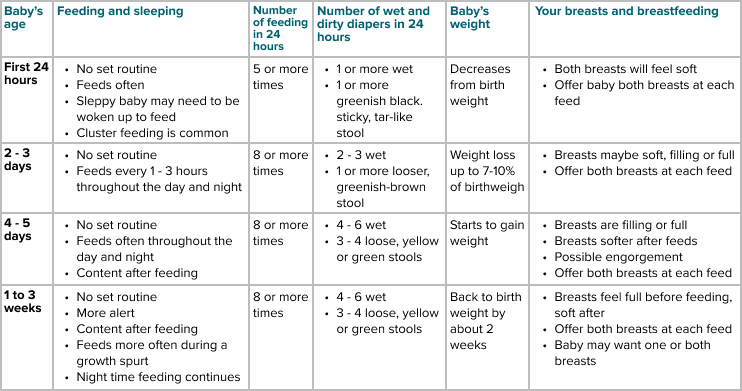
Discharge Information
Please note: this video provides general information for Richmond Hospital Birth Centre. Please contact Birth Centre staff for the most up-to-date details.
Screening and Prevention Programs
BC Newborn Screening Program
A newborn baby can look healthy but have a rare and serious disorder that you and your doctor or midwife may not know about. Newborn screening finds babies who may have one of a number of these rare disorders. When found and treated early, the chances of serious health problems are prevented or reduced later in life. If not treated, these disorders can cause severe health problems.
Before leaving the hospital, a small blood sample is taken from your baby by a heel prick and sent to the laboratory at BC Children’s Hospital to screen for the rare but serious disorders.
You can learn more about this screen by visiting this HealthLinkBC page or download this PDF from Provincial Health Services Authority.
BC Early Hearing Screening Program
Newborn hearing testing is important. Without screening, there are no obvious signs to tell early-on if a baby has hearing loss.
Most babies in BC have their hearing screened before they go home from the hospital. A trained hearing screen technician will use a device to play soft sounds into your baby's ears while a computer measures the response from your baby. The screening tests are safe and will not hurt your baby. Results will be given to you immediately after the test.
For babies not screened in the hospital, hearing screening is offered at your local audiology (hearing) clinic or public health office. There is no cost for this hearing screening and you do not need a referral from your doctor.
Click here for more information.
BC Screening Program for Biliary Atresia - Infant Stool Card
Biliary Atresia
Biliary atresia is a rare but serious liver disease resulting from a blockage in the bile duct. This begins to affect newborns in the first month of life.
Check your baby’s stool colour every day for the first month after birth to screen for Biliary Atresia. If at any time during the first month you notice that your baby has an abnormal stool colour (see Infant Stool Colour Card), please contact Perinatal Services BC at:
- Phone: Toll-free 1-877-5-TEST-4-BA (1-877-583-7842)
- Email: psbc@phsa.ca
The stool colour card is available in multiple languages to help with translation. Please note these cards are not intended to be used for the colours. You should always refer to the English card for accurate colours and refer to the translated version for instructions.
You can learn more about this by visiting Perinatal Services BC.
Newborn Pulse Oximetry Screening – Checking Newborn Babies for Critical Congenital Heart Disease
Critical Congenital Heart Disease (CCHD) refers to conditions related to malformation of a baby’s heart or major blood vessels that occur before birth. A baby with CCHD may not get enough oxygen in their blood. Babies who have CCHD may need emergency care or surgery in their first few days. CCHD is extremely rare but it can be serious if it is not diagnosed quickly.
Babies are checked carefully after delivery and screened before going home. A test called pulse oximetry is used to screen babies for CCHD. This is a quick, painless test to measure how much oxygen is present in a newborn’s blood. The nurse will place a small, soft sensor on your baby’s right hand and one of their feet after he or she is 24 hours old, or just before leaving the hospital.
Newborn Jaundice
Newborn Jaundice (Hyperbilirubinemia)
Newborn jaundice (also known as hyperbilirubinemia) occurs from a normal process where red bloods cells are broken down after birth. As a result, a component of blood called bilirubin is formed. An excess build-up of bilirubin makes the skin and whites of a baby’s eyes appear yellow.
Newborn jaundice is common. In most cases, jaundice in healthy babies is not serious and does not require medical treatment. However it is important to monitor all newborns for excessive jaundice as extremely high levels (while rare) can cause brain damage or hearing loss.
Babies normally excrete bilirubin through their stools (poops). It is important to ensure your baby is feeding well and not too sleepy for their feeds. Birth Centre staff will screen for the level of jaundice as it shows up in their skin and how well your baby is feeding and stooling while you are in hospital. For higher levels of jaundice, the nurse will notify your baby’s care provider, who may order some blood tests or recommend medical treatment (usually phototherapy).
Click here to learn more about newborn jaundice.
Safety
Safer Sleep for My Baby
Your baby’s sleep environment is always important – day or night. There are several ways to make your baby’s sleep safer, including putting your baby on his or her back to sleep; using a firm mattress free of bumper pads, pillows, heavy blankets, and toys; using a separate sleep surface such as crib or bassinet; sharing your room for the first six months; being smoke-free; and breastfeeding / chestfeeding as much as possible.

Your nurse will want to discuss safe sleep practices and explore options on how you can make your baby’s sleep safer.
Download this PDF to learn more about how to help make your baby’s sleep environment as safe as possible.
For information on Sleep Related Infant Death, see this PDF from HealthLinkBC.
Child Car Seats – Birth to One Year
From birth to one year, all babies are required to ride in a rear-facing, Canadian Motor Vehicles Safety Standards (CMVSS) approved infant car seat. This helps to protect and support the baby’s head and spine when travelling in a car, during sudden stops and in the event of a crash.
Your nurse will check your car seat for a CMVSS label, the expiry or manufacture date, the suitability of the seat for your baby’s weight and size, and check for broken, missing, or unnecessary parts. It is against the law to use a car seat that does not meet these standards.
Watch the following videos to learn more:
You can learn more about this by visiting BCAA or Transportation Canada.
Shaken Baby Syndrome Prevention – The Period of PURPLE Crying
Shaken Baby Syndrome (SBS)
Shaken Baby Syndrome (SBS) is the name given to the assortment of signs and symptoms of brain injury resulting from violently shaking an infant, with or without impact to the head. SBS is also known as Traumatic Head Injury due to Child Maltreatment in Canada and Abusive Head Trauma (AHT) in the USA.
Shaking a baby is dangerous because they have fragile, under-developed brains. Their heads are heavy and large compared to the rest of the body and their neck muscles are not strong enough to support the weight of their head. During shaking, an infant's head moves back and forth in a figure eight motion. This rapid acceleration-deceleration causes the brain and skull to move at different speeds in different locations. This may result in permanent brain damage, physical disabilities or death. Even minor injuries to a baby's brain can cause lifelong problems.
It is normal for babies to cry more and for longer periods of time starting at about 2 weeks of age and continuing until about 3 to 4 months. This period of crying is referred to as the Period of PURPLE Crying®.
Not being able to soothe your baby or stop their crying does not mean that you are a bad parent.
If your baby keeps crying:
- Check if hungry, wet or tired
- Talk and sing
- Warm bath
- Skin-to-skin contact
- Go for a walk or car ride
If your baby's crying is frustrating or making you angry, take a break. Gently place your baby in a safe place, such as the crib, and leave the room.
Remember, NEVER shake a baby.
For more information and helpful resources, please visit this HealthLinkBC page or download this PDF.
Breastfeeding / Chestfeeding
Human milk is the only food your baby needs for the first 6 months. When your baby starts solid foods (around 6 months), you can continue to offer human milk until your baby is 2 years old and beyond.
While you are breastfeeding / chestfeeding, your baby will require 400IU of liquid Vitamin D drops, once a day. Vitamin D is needed to build strong bones and teeth. It may also play a role in reducing the risk of many chronic diseases. Start giving it once a day as soon as possible following birth, or as directed by your care provider. Click here to learn more.
Human milk is good for your baby because:
- It is the safest and healthiest food for babies
- It is easy for your baby to digest
- May help promote your baby’s physical, emotional and intellectual development
- Babies fed human milk may have fewer infections, such as pneumonia, ear infections and diarrhea
- Breastfeeding / chestfeeding may reduce the risk of sudden infant death syndrome (SIDS)
Breastfeeding in the First 3 Weeks

Download this PDF for your reference.
Additional Resources:
Birth Registration

A record of your birth will be submitted to the Government of BC Department of Vital Statistics. A pamphlet with more information will be given to you before you go home.
The birth registration process is online - to register, click here.
Going Home with Your Baby
You will need to make an appointment with your Family Physician or Midwife to check the health of you and your baby within one week after birth. It is important that you and your baby are seen in-person. Your care provider will want you to bring your “Going Home with Your Baby – Discharge Information” brochure, which will be given to you by the nurses before you leave the hospital.